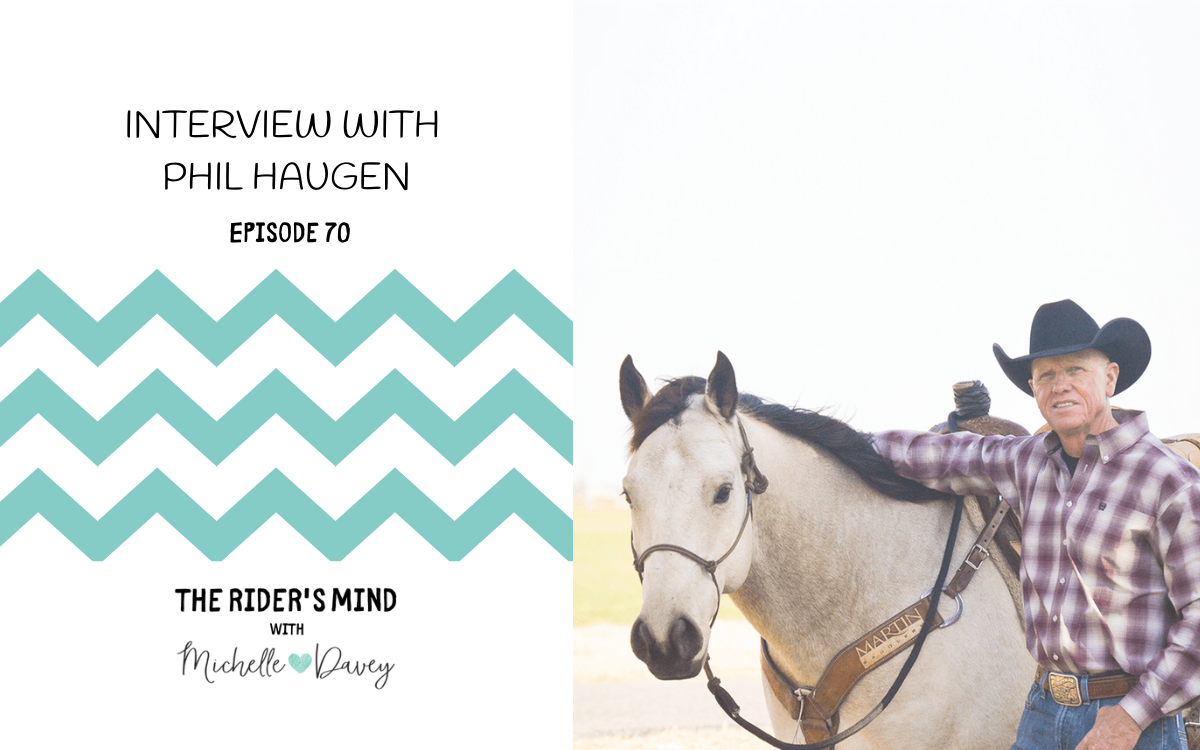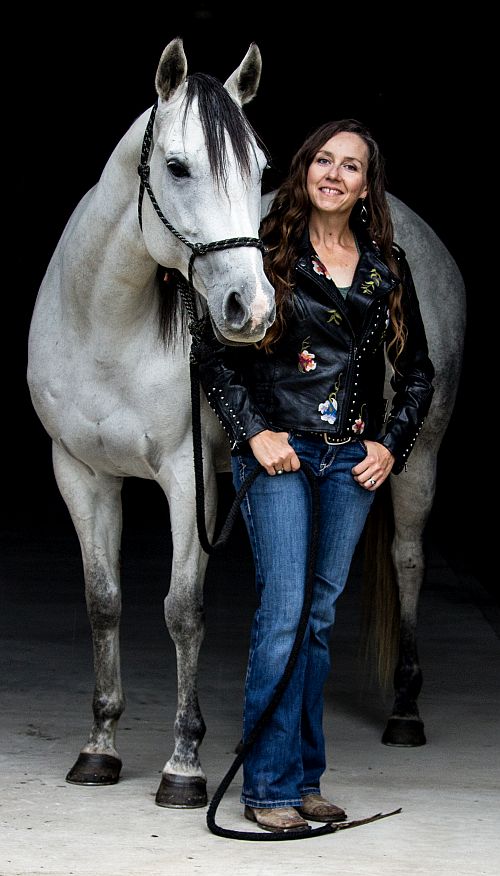
The Rider’s Mind Podcast Episode 70: Interview with Phil Haugen
Professional horse trainer and clinician, Phil Haugen joins me for this episode. Phil has over 30 years of training experience. He has competed in calf roping, team roping and saddle bronc riding in the PRCA. He has developed a unique training program, which is focused on fundamentals. Phil has a keen understanding of how to progress a horse in its training while mentally keeping that horse in a trusting, secure and confident state of mind. In this episode, he shares advice from his journey to becoming the horseman he is today.
Phil: People are learning that horsemanship isn’t just about physically manipulating a horse. The changes really do come from within. The only way I’ve ever been able to progress and change is by changing me. Changing the way I look at things, changing the way I approach things, changing the way I react to situations… it’s everything.
Michelle: Having listened to many of your podcast episodes I would describe you as very mindful, aware, and present to your own actions and how that impacts the horses you ride.
Have you always been aware like this? And if not, can you share your story and your progression from young Phil to current Phil and how the way you see horse training and horsemanship has changed?
Phil: When I was younger, I was the total opposite. I was all about getting it done. I was kicking, tugging, pulling. I could always ride. From a physical ability standpoint, I had a lot more skills then. I had a good horse training business, but I was not reaching my potential.
I vividly remember a hot day when my horses were frustrated and I was too. I realized that I needed to get better. If every horse I was riding had the same response and they were frustrated, that was not their fault; that was my fault. At that point, I went and got help and input from others. Before that, I’d been too proud to ask.
“When you ask for help, you’re growing. Just accept the fact that you’re never going to know it all.”
When you’re learning and attending clinics, it can be hard to hear things you don’t want to hear. The growth in horsemanship and your performance all comes from mental growth and the understanding that not everyone is going to agree with you and the way you do things. When it comes to horsemanship, you just need to understand that the communication between you and your horse is what really matters. As a horse trainer, you need to ask yourself: “Am I building confidence every day or am I destroying it?”
“The better listeners we are, the better trainers we become.”
Michelle: Are there any other pivotal moments in your journey as a horse trainer so far?
Phil: Growing up, I was not a very patient person. I don’t like lines. I don’t like traffic. But I’ve learned that I have to be patient. When I ask for a response, I need to give the horse time to process and find the answer. When we’re riding around, we have a plan for what we’re going to do, but our horses have no idea what’s next.
I have to continually tell myself to slow down. You see that in barrel racing a bunch because with speed and adrenaline, you get faster and stronger with your hands. When you’re fast, you get faster and stronger which can scare your horse.
Patience is something I have to work on daily.
Michelle: How have you changed as a competitor over the years?
Phil: I had my PRCA card for 20 years. Back then, I was a struggling rodeo cowboy with no money. I was so hard on myself if I messed up an opportunity. I remember getting bucked off a horse at Cheyenne one year when I had a huge chance to improve in the standings and I beat myself up over it. I let situations affect me instead of clearing the slate and moving on.
Now, I’m in a different situation. I’m not trying to make a living at rodeos. I still like to compete as long as I’m prepared. When I’m prepared, I’m fine with the results – good or bad. If I’m not prepared, I’m disgusted with myself. The thing that holds me back now is my schedule because I’m often gone for clinics and have limits on my preparation. If I’m going to compete, I set goals and make time to prepare. Now, I don’t beat myself up over the results.
“If you want to get better, you have to invest in yourself.”
Michelle: Do you have a morning routine that sets you up for success each day? What does that look like and how does it help your “rider’s mind”?
Phil: I do have a morning routine. I workout at home. Every morning, my brain says “Let’s skip this” and I have to talk myself into it. I want to stay active and I want to overcome that mental desire to skip the workout.
I also have a journal and I write down 10 things I’m grateful for. That plants a seed for the day.
I try to read or listen to something faith-based. I always need to work on getting better in that area as well.
I usually do something cold – a cold shower or some cold water splashed on my face or a cold walk outside. I want that cold shock to wake up.
It’s a simple routine. I do it at least 5 days a week.
“Winners do what losers don’t want to do.” – Gary Busey
Michelle: What are some tips you could offer someone who struggles with nervousness when they go to compete?
Phil: One thing that helps is to establish a warm up ritual at home before you go to compete. It helps your horse’s confidence to have consistency. Keep it simple. Don’t start looking around at others and change things.
You will have anxiety and anticipation. There will be self-doubt that creeps into your head. Just keep it simple and be prepared. Make preparation a priority. Make sure your expectations are realistic based on your preparation.
“The way your horse performs is a reflection of your preparation.”
Michelle: An emotion a lot of horse people deal with is frustration. Do you have advice on how to avoid being overwhelmed with frustration in the saddle?
Phil: Understand that you will be frustrated. The thing you have control of is how you react to it. Frustration can cause you to retaliate, which does not end well. When you’re frustrated, remember that your horse is 10x more frustrated. Be a good listener for your horse.
When I get frustrated, I go back to something simple for the horse to start building confidence again. Do something they can get right.
“Confidence is gained through consistency over time. Confidence isn’t owed; we earn it”
Michelle: What type of characteristics would you use to describe someone you see as a champion?
Phil: Aware. Confident. Consistent.
Champions show up every day at the barn. They are ready to move forward. They are not afraid of failing. They almost welcome the opportunity to fail so they can learn.
Michelle: Is there a horse you’re a big fan of (in any event)?
Phil: Donna Kay Rule’s High Valor
Michelle: Do you have a favorite client horse from the past?
Phil: High Valor, Murphy (my brother and sister-in-law’s horse)
Michelle: What are 3 qualities you love to have in a horse that you’re going to start?
Phil: Conformation. Disposition. Effort.
Michelle: Do you have an NFR prediction in the barrel racing or are you rooting for anyone in particular?
Phil: I think Donna Kay Rule and High Valor will get their share. Emily Miller has got the horse power and is a phenomenal jockey. Hailey and Sister are also great.
Michelle: If you could have a billboard anywhere what would it say?
Phil: Be Your Best Today.
Want to learn more from Phil?
Check out Phil’s Podcast: Be Your Best Horsemanship
Explore Phil’s Courses and Clinics
You can also join Stride, my next-level barrel racing group to access a special guest interview with Phil.
Join the Conversation
Join the discussion in the The Rider’s Mind Community on Facebook. As a member of this community, you’ll also get tips and videos from me.
Want to connect or ask me a question? Find me on Instagram or Facebook.
Subscribe: Apple Podcasts or Spotify

